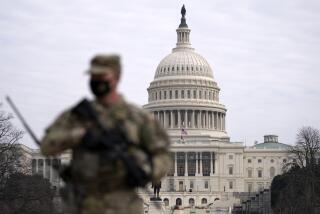Bosnia Enters Capitol Hill’s Comfort Zone
- Share via
WASHINGTON — The broad congressional support that President Clinton received this week for keeping U.S. troops in the Balkans after next summer shows that, at least where Bosnia is concerned, lawmakers have overcome their aversion to continuing the peacekeeping mission.
But it is not clear how much the success of the Bosnia effort might carry over to future military operations in other parts of the world.
Although administration officials insisted that Clinton has not yet decided if any of approximately 8,000 U.S. troops now in Bosnia will be needed there after June, the promised deadline for their departure, sentiment on Capitol Hill has swung strongly in favor of extending the mission.
Secretary of State Madeleine Albright said Wednesday that, during a White House meeting of Democratic and Republican lawmakers Tuesday, there was “a consensus that we need to do whatever is necessary to implement Dayton, to make Dayton work.”
She was referring to the Bosnia peace agreement negotiated in 1995 at Dayton, Ohio.
Such a consensus for continuing an overseas peacekeeping and nation-building mission would have been unthinkable a year ago.
But lawmakers warned that there are limits to their acceptance of overseas missions.
“This is fairly unique to Bosnia,” said Sen. Joseph R. Biden Jr. of Delaware, the senior Democrat on the Senate Foreign Relations Committee.
He said the lawmakers appear to have concluded that “the risk of staying is not as much as they thought, and the payoff is much bigger.”
Administration officials also shied away from trying to extend the Bosnia-Herzegovina consensus to cover peacekeeping in general.
“Certainly there is a consensus that the U.S. has a stake in regional stability. A lot of it is due to our being able to point to successes” in Bosnia, one administration official said. Also, less than 24 hours after the crucial White House meeting, some congressional participants lodged dissent about the upbeat assessment of its outcome.
“I am in complete disagreement with Secretary Albright,” Sen. John McCain (R-Ariz.) said in a telephone interview. “In my view there is not consensus in the Senate. . . . As far as I know, there is still no exit strategy.”
Sen. Kay Bailey Hutchison (R-Texas) said many Republicans were simply resigned to the fact that the president will find some way of keeping the force in the Balkans regardless of the sentiment on Capitol Hill.
Nevertheless, many other lawmakers who once foresaw a quagmire in Bosnia and extreme risks for U.S. soldiers are now weighing the factors that have made it turn out otherwise.
On one key point, despite severe misgivings about the original deployment of U.S. troops in 1995, Bosnia has turned out to be safer for U.S. forces than garrison duty in the United States. There have been no American deaths because of hostile action and comparatively few accidents.
“The funny thing about Bosnia is that nothing has gone wrong yet,” said a top foreign policy strategist for a senior Democratic senator. “There is not the sense of doom that there was a couple of years ago.”
Moreover, it is becoming clear to all that the North Atlantic Treaty Organization-led international force is the only thing preventing a resumption of Europe’s bloodiest war since 1945. And, after a long period of skepticism, U.S. lawmakers have come to accept the warnings of European countries that if the U.S. pulls out of Bosnia, they will too.
Last month, a team of staff members from the House International Relations Committee made a little-noticed inspection tour of Bosnia. According to an aide to a lawmaker who had strongly opposed an open-ended U.S. troop commitment, the report was sobering.
“There was a consensus on the ground that U.S. troops would have to be there indefinitely,” the aide said. “There was no way out of it. If the U.S. pulls out, other forces will pull out, and there would be war again.”
Among senior military leaders, initial qualms about the Bosnia mission have been overcome by the generally smooth operation.
“The disaster scenario just hasn’t happened,” one senior military officer said.
He added that the mission, far from being a source of anguish, “has given us a lot to crow about.”
A senior administration official said that some sort of U.S. military presence will be required after June, probably involving progressively closer cooperation between the troops and the civilians assigned to help build a stable postwar government.
Times staff writer Paul Richter contributed to this report.
More to Read
Get the L.A. Times Politics newsletter
Deeply reported insights into legislation, politics and policy from Sacramento, Washington and beyond. In your inbox twice per week.
You may occasionally receive promotional content from the Los Angeles Times.










